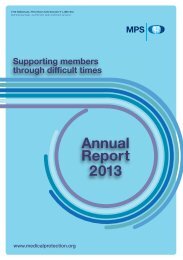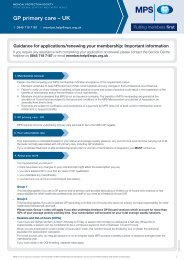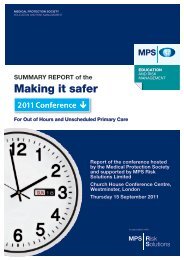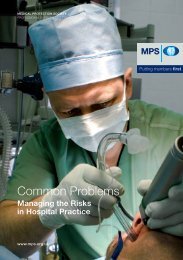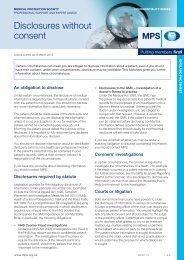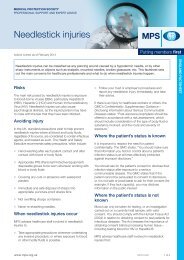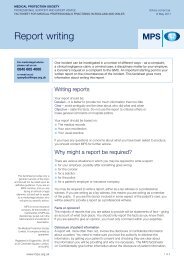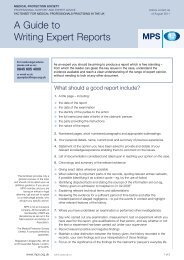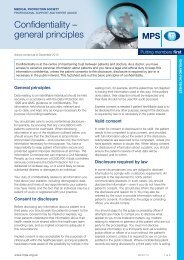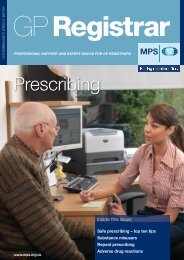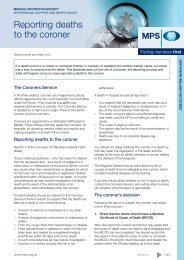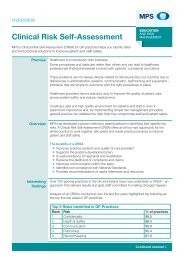Dr Rob Hendry - Medical Protection Society
Dr Rob Hendry - Medical Protection Society
Dr Rob Hendry - Medical Protection Society
You also want an ePaper? Increase the reach of your titles
YUMPU automatically turns print PDFs into web optimized ePapers that Google loves.
8<br />
SPECIAL FEATURE<br />
UNITED KINGDOM CASEBOOK | VOLUME 19 | ISSUE 1 | JANUARY 2011 www.mps.org.uk<br />
On the<br />
defensive<br />
Many doctors have an inflated perception of the risk<br />
of being sued, so practise with a dagger at their back.<br />
Sara Williams asks: are they missing the point?<br />
A<br />
US student went to her local<br />
emergency department<br />
suffering from stomach pains. A<br />
computed tomography scan revealed<br />
an ovarian cyst; she then presented<br />
her father with an $8,500 bill. Her<br />
father, a medical director, argued that<br />
a history, a pelvic examination and an<br />
ultrasound would have been adequate. 1<br />
The hospital defended the CAT<br />
scan claiming that an ultrasound may<br />
have missed something more serious,<br />
such as appendicitis or a kidney<br />
stone. Although her father agreed,<br />
he argued that the hospital should<br />
have started with the ultrasound<br />
and undertaken the CAT scan only<br />
if necessary. He then contacted the<br />
national media, accusing the hospital<br />
of performing defensive medicine.<br />
Do you order every test on every<br />
patient? Do you avoid certain<br />
procedures for fear of being sued<br />
over a clinical stumble? Do you<br />
refer every patient with a cough?<br />
If you answered “yes” to all of these,<br />
you are practising defensive medicine.<br />
As global medicine has become more<br />
litigious, such performance patterns<br />
are becoming more widespread. This<br />
“retrospectoscope” phenomenon not<br />
only draws attention away from good<br />
clinical diagnosis, in favour of tick-box<br />
medicine, but it could put patients<br />
at risk through risky procedures by<br />
medicalising the well patient. 2<br />
WHY DO DOCTORS<br />
PRACTISE DEFENSIVELY?<br />
Media scrutiny<br />
A Casebook survey (see page 9 for<br />
more information) revealed that 70%<br />
of MPS members identified media<br />
criticism of health professionals as a<br />
contributing factor to them practising<br />
defensively. In countries such as<br />
Singapore and Hong Kong, the press<br />
are very aggressive and critical of<br />
doctors. As most of the work is private<br />
practice, such criticism could affect<br />
their reputation and thus their income.<br />
Non-monetary cost of litigation<br />
The personal impact of litigation, such<br />
as the value of lost time, emotional<br />
energy and reputational damage, is<br />
often perceived to be more costly<br />
than the cost of taking precautions. 3<br />
Hero complex<br />
If a doctor ordered a significant<br />
number of tests, where the prevalence<br />
of disease was low, they would<br />
occasionally pick up on early-stage<br />
malignancies and other pathologies,<br />
earning them a reputation as a great<br />
doctor or a “hero” to patients.<br />
Societal expectations<br />
Speaking last year at a patient safety<br />
conference, internationally-renowned FOTOCROMO/iStockphoto.com



